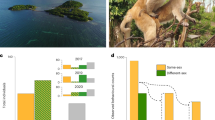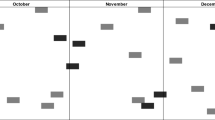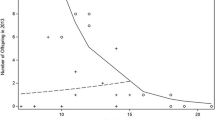Abstract
Either during or shortly after sexual maturation, male rhesus monkeys leave the social groups in which they were born and join other non-natal groups (refs 1, 2 and unpublished data). Here we report that males frequently transfer into the same social groups as their older maternally related brothers. Such brothers spent more time close to each other than to other males, formed alliances with brothers more frequently than with non-brothers and disrupted each other's interactions with oestrous females less frequently than expected by chance. They also spent more time in non-natal groups than did males who did not have a brother in the group. Length of time in a group is positively associated with male dominance rank1 and probably with reproductive success. The data are consistent with proposals that brothers who behave nepotistically and noncompetitively have high inclusive fitness.
This is a preview of subscription content, access via your institution
Access options
Subscribe to this journal
Receive 51 print issues and online access
$199.00 per year
only $3.90 per issue
Buy this article
- Purchase on Springer Link
- Instant access to full article PDF
Prices may be subject to local taxes which are calculated during checkout
Similar content being viewed by others
References
Drickamer, L. C. & Vessey, S. H. Primates 14, 359–368 (1973).
Lindburg, D. G. Science 166, 1176–1178 (1969).
Altmann, J. Behaviour 49, 227–265 (1974).
Vandenbergh, J. G. Behaviour 29, 179–194 (1967).
Vessey, S. H. Folia Primatol. 8, 228–239 (1968).
Kurland, J. Contr. Primatol. 12, (1977).
Massey, A. Behav. Ecol. Sociobiol. 2, 31–40 (1977).
Kaplan, J. Am. J. phys. Anthrop. 49, 241–250 (1978).
Sade, D. S. in Social Communication Among Primates (ed. Altmann, S.) 99–114 (University of Chicago Press, 1967).
Bernstein, I. S. J. theor. Biol. 60, 459–472 (1976).
Duvall, S. W., Bernstein, I. S. & Gordon, T. P. J. Reprod. Fert. 47, 25–31 (1976).
Smith, D. G. Am. J. phys. Anthrop. 53, 243–249 (1980).
Goodall, J. in Primate Behavior: Field Studies of Monkeys and Apes (ed. DeVore, I.) 425–481 (Holt, Rinehart & Winston, New York, 1965).
Boelkins, R. C. & Wilson, A. P. Primates 13, 125–140 (1972).
Cairns, R. B. Psychol. Rev. 73, 409–426 (1966).
Wu, H. M. H., Holmes, W. G., Medina, S. R. & Sackett, G. P. Nature 285, 225–227 (1980).
Hamilton, W. D. J. theor. Biol. 7, 1–52 (1964).
Author information
Authors and Affiliations
Rights and permissions
About this article
Cite this article
Meikle, D., Vessey, S. Nepotism among rhesus monkey brothers. Nature 294, 160–161 (1981). https://doi.org/10.1038/294160a0
Received:
Accepted:
Issue Date:
DOI: https://doi.org/10.1038/294160a0
This article is cited by
-
Social resource foraging is guided by the principles of the Marginal Value Theorem
Scientific Reports (2017)
-
Determinants of immigration strategies in male crested macaques (Macaca nigra)
Scientific Reports (2016)
-
Individual dispersal decisions affect fitness via maternal rank effects in male rhesus macaques
Scientific Reports (2016)
-
Genetic, spatial, and social relationships among adults in a group of howler monkeys (Alouatta palliata) from Barro Colorado Island, Panama
Primates (2016)
-
Male rhesus macaques use vocalizations to distinguish female maternal, but not paternal, kin from non-kin
Behavioral Ecology and Sociobiology (2015)
Comments
By submitting a comment you agree to abide by our Terms and Community Guidelines. If you find something abusive or that does not comply with our terms or guidelines please flag it as inappropriate.



